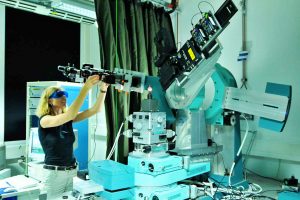The Experimental Platform

An advantage of SoftComp is that novel and unique light-scattering instruments developed by one research group can be used by other partners in the Network. Copyright: Forschungszentrum Jülich
Soft-matter research requires a diverse range of experimental platforms ranging from large facilities (for example for neutron scattering, X-ray scattering, NMR, and electron microscopy) to smaller specialized equipment belonging to individual partners. The novel equipment offered by SoftComp is often home-build and not commercially available. The Experimental Platform thus enables access to a diverse set of equipment in order to probe for example micro-structural order, dynamics, transport phenomena, and the response to external fields over a large range of length- and time scales, providing to all Network Areas.
Experimental Platform maintains an inventor of equipment (given in the Overview Table below), which is made available for visitors scientists, including PhD students and posts docs. This table also contains the local responsible scientist and the corresponding contact information. We advice you to contact the local scientist before submitting a proposal, in order to assess the availability of the equipment and the feasibility of your planned experiments. You may also ask, if necessary, to be assisted or have a training during your visit in performing your experiments.
Experimental Platform Leader: Dr. Kyongok Kang, Forschungszentrum Juelich, IBI-4, Juelich, Germany
Contact: Kyongok Kang
Overview Table: SoftComp Experimental Inventory
| Experimental Techniques |
Experimental Equipment Group |
Access Point/ Contact |
Partners |
| Neutron Scattering |
Small-angle neutron scattering,(SANS) High-resolution inelastic neutron scattering Medium-resolution inelastic neutron scattering Neutron reflectronomy Neutron defraction/polarisation analysis |
R.Zorn, FZ-Juelich |
FZ-Juelich |
| X-ray Scattering |
Wide-angle x-ray scattering Small-angle x-ray scattering …coming up soon |
L.Ramos, Montpellier |
CNRS-Montpellier Univ.Göttingen |
| Light Scattering |
DLS-SLS Speciality DLS Diffusive wave spectroscopy Small-angle light scattering Brillouin Scattering |
B.Loppinet, FORTH |
FORTH Univ.Edingburgh CNRS-Montpellier |
| Spectroscopy | Dielectric Spectroscopy (Time domain method) Dielectric Spectroscopy (Frequency domain method) NMR |
Angel.Alegria, San Sebastian |
San Sebastian |
| Rheometry rheo-optics |
Rotational rheometry, strain controlled Rotational rheometry, stress controlled Capillary rheometry Extensional rheometry Interfacial rheometry rheo-optics |
P.van Puyvelde, Univ.Leuven |
Univ.Leuven FORTH FZ-Juelich Univ.Leeds |
| Light Microscopy |
Confocal Fluorescence |
J.K.G.Dhont, Fz-Juelich |
FZ-Juelich Univ.Utrecht Univ.Poznan Univ.Edingburgh Inst. Curie |
| Electron Microscopy
Cryo Techniques |
EFTEM TEM/STEM SEM ESEM AFMFESEM, with FIB |
Belkoura, Uni-Koeln |
Uni.Koeln Uni.VigoUniv. Rovira i Virgili |
